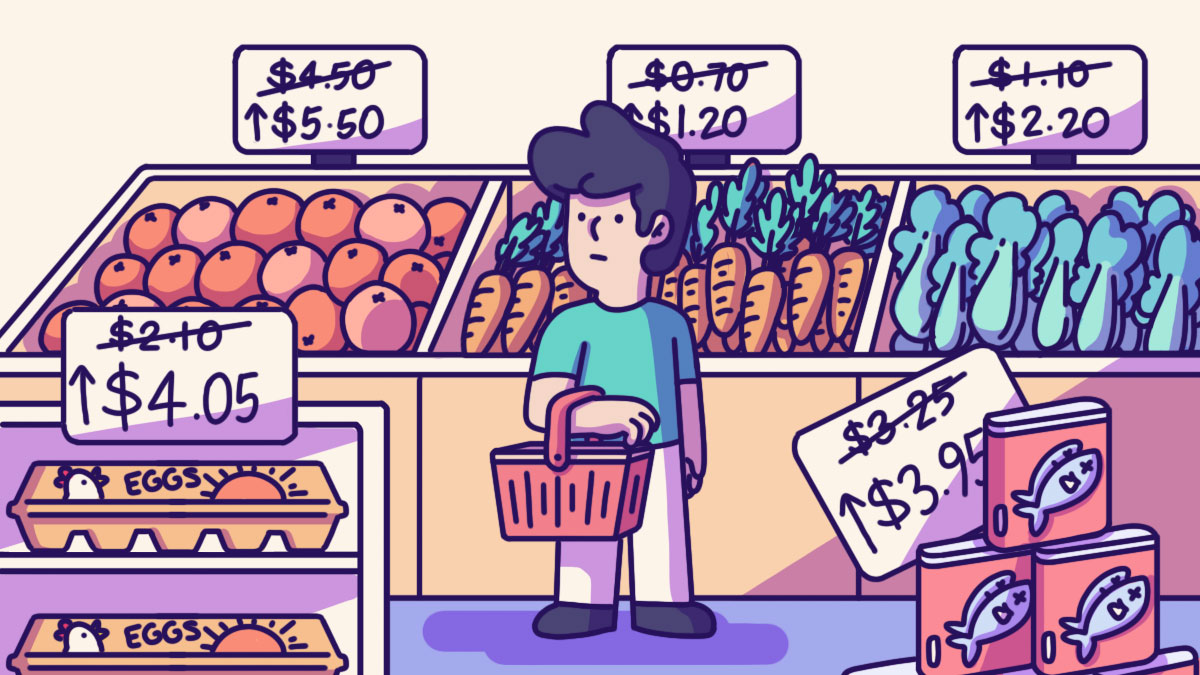
Inflation isn’t just a number economists talk about on the news—it’s something that touches your everyday life. From the groceries in your cart to the petrol in your tank, the rent you pay, and even the price of your morning coffee, inflation directly affects your daily spending power.
In simple terms, inflation is the gradual increase in prices over time, which reduces the purchasing power of money. But the way it influences your life is far more complex. This guide breaks down how inflation works, why it matters, and most importantly, how you can protect yourself and your finances.
What Is Inflation?
Inflation is the rate at which the general level of prices for goods and services rises. When inflation goes up, each dollar buys less than before.
- Mild Inflation: A steady rise in prices (2–3% annually) is considered normal and even healthy for the economy.
- High Inflation: When prices increase rapidly, wages often fail to keep pace, squeezing households.
- Deflation: The opposite of inflation—prices fall, but this often signals economic trouble.
Why Inflation Happens
Several factors drive inflation:
- Demand-Pull Inflation: When demand for goods and services exceeds supply.
- Cost-Push Inflation: Rising production costs (like wages or raw materials) push prices higher.
- Built-In Inflation: Businesses raise prices to cover rising costs, while workers demand higher wages to keep up.
Global events—like pandemics, wars, and supply chain disruptions—can also trigger inflation spikes.
The Hidden Ways Inflation Affects Daily Life
1. Groceries and Food Prices
You may have noticed your supermarket bill creeping up. Essentials like bread, milk, meat, and produce often rise first because they’re affected by global supply chains, fuel costs, and agricultural challenges.
2. Housing and Rent
Inflation often drives up housing costs. Renters see higher monthly payments, while homeowners may face increased property taxes and maintenance costs.
3. Transport and Petrol
Fuel prices are highly sensitive to inflation. Rising oil prices ripple across transport, delivery fees, and even flight tickets.
4. Utilities and Energy Bills
Electricity, gas, and water become more expensive as suppliers pass on higher operating costs.
5. Healthcare
Medical care and prescription drug prices typically climb faster than general inflation.
6. Everyday Luxuries
From a takeaway meal to your Netflix subscription, small luxuries creep up in cost.
Inflation and Your Salary
While some employers raise wages to keep up with inflation, increases rarely match rising prices. This means that even if your paycheck is higher, your real purchasing power may shrink.
Inflation’s Ripple Effect on Debt and Savings
- Debt: If you have fixed-rate debt, inflation can work in your favour because you repay loans with “cheaper” money.
- Savings: Inflation erodes the value of savings if they’re sitting in low-interest accounts. $1,000 today may not buy the same goods in 5 years.
Coping with Inflation: Practical Tips
- Track Your Spending – Know where your money goes so you can cut unnecessary expenses.
- Prioritise Needs Over Wants – Focus on essentials and delay luxury purchases.
- Shop Smarter – Compare prices, use coupons, and buy in bulk where possible.
- Invest Wisely – Look into assets like stocks, real estate, or inflation-protected bonds.
- Boost Your Income – Side hustles, freelancing, or negotiating a raise can offset inflation.
- Build an Emergency Fund – Cushion yourself against unexpected costs.
Midway Reflection: Inflation Beyond Your Wallet
Inflation doesn’t just impact households—it reshapes industries and economies. Digital platforms and entertainment businesses also feel its effects, adjusting pricing models, loyalty programs, and rewards to keep users engaged. For example, kingjohnnie.me demonstrates how businesses adapt by offering value-driven experiences that keep customers coming back, even as broader costs rise. The lesson? Inflation is universal—it touches every sector of life.
The Psychology of Inflation
Inflation isn’t only financial—it’s emotional. Rising prices create stress, forcing families to make tough choices. It can also fuel “shrinkflation”, where products stay the same price but come in smaller packages.
Inflation and Investments
Some assets perform better during inflationary periods:
- Real Estate: Property values often climb with inflation.
- Stocks: Many companies pass costs to consumers, keeping profits steady.
- Commodities: Gold, oil, and agricultural goods often rise in value.
- Cryptocurrency: While volatile, some investors view crypto as a hedge.
Government and Central Bank Responses
Central banks like the Federal Reserve or Reserve Bank of Australia combat inflation by adjusting interest rates. Higher rates make borrowing more expensive, cooling demand, but they can also slow economic growth.
Governments may also intervene with subsidies, tax relief, or direct aid to ease pressure on households.
Long-Term Effects of Inflation on Lifestyle
If inflation persists, you may notice:
- Changing Consumption Habits: More people cooking at home, using public transport, or shopping discount brands.
- Housing Shifts: Families downsizing or relocating to cheaper areas.
- Career Choices: Workers demanding higher pay or shifting industries.
- Wealth Gap Growth: Inflation often impacts low-income households the hardest.
How to Future-Proof Your Finances Against Inflation
- Diversify Investments: Spread money across multiple asset classes.
- Increase Financial Literacy: Stay informed about economic trends.
- Focus on Skills: Career growth often outpaces inflation if you keep upskilling.
- Plan Long-Term: Don’t panic—consistent strategies build resilience.
Conclusion: Inflation Is Unavoidable, But Manageable
Inflation may be inevitable, but it doesn’t have to control your life. By understanding how it impacts daily spending, adjusting your budget, investing wisely, and making proactive financial choices, you can protect your purchasing power and stay ahead of rising costs.
The key isn’t to fear inflation—it’s to prepare for it. With the right strategies, you can continue living well even when prices rise.
Leave a Reply